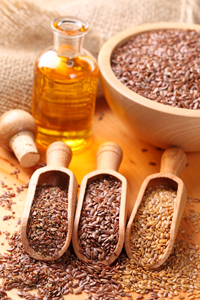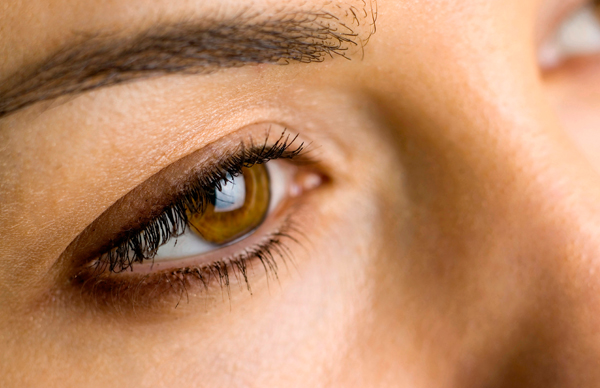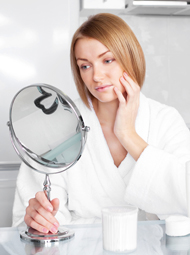What are some of the causes of increased androgens in women?
Common causes of androgen hormonal imbalances in women include PCOS, adrenal tumors, Cushing syndrome, hyperthecosis, congenital adrenal hyperplasia, and hyperprolactinemia. Pregnancy and ingesting supplementary sources of androgens can also contribute to high levels of androgens in women.
 Polycystic Ovarian Syndrome is responsible for 80 – 90 percent of high levels of androgens in women.1 About 70 percent of women with PCOS have high testosterone levels and 20 – 30 percent of women with PCOS can have slightly higher-than-normal levels of DHEA-S.1
Polycystic Ovarian Syndrome is responsible for 80 – 90 percent of high levels of androgens in women.1 About 70 percent of women with PCOS have high testosterone levels and 20 – 30 percent of women with PCOS can have slightly higher-than-normal levels of DHEA-S.1
- HAIR-AN is a syndrome that occurs in some women with Polycystic Ovarian Syndrome.1 Women with HAIR-AN syndrome have androgen excess, insulin resistance, obesity, and acanthosis nigricans (patches of dark, velvety skin) but don’t have the insulin receptor defect common in Polycystic Ovarian Syndrome.1
- Hyperthecosis is responsible for less than one percent of high levels of androgens in women during their fertile years, but for many of the cases of these hormonal imbalances after menopause.1 In hyperthecosis, theca cell nests are scattered throughout the ovaries instead of in uniform pattern as they are in PCOS, and there isn’t follicle development as there is in Polycystic Ovarian Syndrome. 4 While hyperthecosis characteristics can look like PCOS symptoms, the androgen hormonal imbalances are much higher in hyperthecosis and the masculinizing effects are much greater.1,4
- Congenital adrenal hyperplasia is a group of genetic disorders that contribute to high levels of androgens in women.1 NCAH accounts for about two percent of cases of high levels of androgens in women and is related to blockages of cortisol production and enzyme deficiencies.1
- Cushing syndrome is a rare adrenal disorder with characteristics that resemble PCOS symptoms and has to do with cortisol secretion. Glucocorticoids can cause Cushing syndrome as can adrenal gland disorders, adrenal tumors, and other cancerous tumors.1
- Androgen-secreting tumors or neoplasms are another rare cause of high androgens in
 women.1 They have much higher masculinizing effects than PCOS does, and the symptoms tend to develop much more rapidly than they do in Polycystic Ovarian Syndrome.1
women.1 They have much higher masculinizing effects than PCOS does, and the symptoms tend to develop much more rapidly than they do in Polycystic Ovarian Syndrome.1
- Hyperprolactinemia describes high prolactin levels and high levels of androgens in women.1 The link between prolactin levels and androgen excess is still not understood.1
- Pregnancy can account for high levels of androgens in women when a placental enzyme deficiency fails to protect the mother and fetus from the normally-rising levels of testosterone during pregnancy.1
- Anabolic steroids and other drugs can contribute to high levels of androgens in women.1 These drugs are used to enhance athletic performance, libido, or for purely cosmetic reasons.1
+ Click here to read more articles about PCOS and Hormones
Symptoms
What are the symptoms of high levels of androgens in women?
Symptoms of high adrenal androgen hormonal imbalances and PCOS symptoms can be similar but there are some differences.
- High levels of androgens in women contribute to hirsutism in 70 – 80 percent of women with androgen excess.1 Hirsutism describes excessive and unwanted male-pattern hair growth in women with Polycystic Ovarian Syndrome and other hormonal imbalances.
 High levels of androgens in women contribute to inflammatory components in the skin and oil overproduction.1 This can lead to acne development. Not all women with PCOS develop acne and acne alone is not a good signifier of PCOS. 4
High levels of androgens in women contribute to inflammatory components in the skin and oil overproduction.1 This can lead to acne development. Not all women with PCOS develop acne and acne alone is not a good signifier of PCOS. 4
- Androgen hormonal imbalances can also lead to infertility and hyperinsulemia (high levels of insulin in the blood).1 Insulin resistance and high levels of androgens in women with PCOS can contribute to the development of cardiovascular disease and diabetes.1
- Acanthosis nigricans is a skin condition that can be seen in obese women with PCOS and in women with androgen-secreting tumors.1,4 These patches of dark, velvety skin are linked with Insulin Resistance.4
- Virilization refers to a host of masculinizing characteristics that can occur because of high levels of androgens in women.Although the PCOS symptoms of acne, facial hair growth, infertility, and scalp hair loss can mimic the virilization that occurs in adrenal gland disorders, virilization is a term used to describe more severe masculinizing symptoms such as loss of feminine contour, lowering of voice, and extension of the clitoris.1,3,4
Treatment Options
Medical Treatment Options for PCOS Hormonal Imbalance
Treatment for high levels of androgens in women with PCOS depends on ruling out adrenal disorders. As stated earlier, glucocorticoids used to treat some adrenal disorders can worsen Insulin Resistance in women with Polycystic Ovarian Syndrome. In addition, disorders like cancerous tumors and Cushing syndrome are life-threatening and need immediate addressing.1 Although women with Polycystic Ovarian Syndrome do have increased health risks, they most often seek treatment for cosmetic reasons or because of infertility. Ask your doctor to assess your cortisol, DHEA, DHEA-S, and testosterone levels to determine which treatments are right for your PCOS symptoms.

Medical treatments to address high levels of androgens in women with PCOS include:1
- Oral contraceptives
- Insulin sensitizers
- Th antiandrogens finasteride, flutamide, spiralactone, and cyproterone acetate (cyproterone is only available outside the U.S.)
- Topical anti-androgen eflornithine
In a 2004 study of 1,000 women with Polycystic Ovarian Syndrome, Dr. Azziz and his colleagues found that anti-androgens and oral contraceptives treatments could alleviate the PCOS symptoms of acne, hair growth, and menstrual irregularity but did not help with scalp hair loss.5 The researchers also reported that over 60 percent of the women with Polycystic Ovarian Syndrome treated with these hormonal suppressants experienced side effects.5
Non-hormonal medical treatments for symptoms of high levels of androgens in women with PCOS include antibiotics and retinoids for acne, surgery for infertility, and hair removal treatments such as depilatory creams, shaving, and waxing.1
Natural Therapies
Natural Therapies for Androgen Excess in Polycystic Ovarian Syndrome

The Androgen Excess and Polycystic Ovary Syndrome Society espouses lifestyle changes as the go-to treatment for women with PCOS.6 That’s because diet and exercise can greatly reduce Insulin Resistance and PCOS symptoms. If you are overweight or obese, hormonal imbalances are amplified and it is unlikely that other treatments for hirsutism will be effective.1 Losing just 5 -10 percent of your body weight, however, will lessen PCOS hair growth and improve other PCOS symptoms.1
It’s not enough for a woman with Polycystic Ovarian Syndrome to go on a temporary diet  and exercise plan. Lifestyle modification must be a life-long practice for a women with Polycystic Ovarian Syndrome who wants to manage PCOS symptoms and androgen excess. A program that helps you understand your behavioral triggers helps you learn healthy habits and offers the social support necessary to sustain healthy lifestyle changes.
and exercise plan. Lifestyle modification must be a life-long practice for a women with Polycystic Ovarian Syndrome who wants to manage PCOS symptoms and androgen excess. A program that helps you understand your behavioral triggers helps you learn healthy habits and offers the social support necessary to sustain healthy lifestyle changes.
Botanicals that have shown promise in reducing high levels of androgens in women with Polycystic Ovarian Syndrome include:7
- Curcumin
- Flaxseed
- Quercetin
- N-acetyl cysteine
- Pygeum africanum
- Saw palmetto
- Urtica dioica
It’s important to consult a dietician and/or a doctor before taking any kind of nutritional supplement as they can interfere with other conditions and prescription medications.
Next Steps
- Take the PCOS Quiz! Get your score and assess your hormone health risks.
- Join our Facebook Sisterhood Group Pose your questions to this group of like-minded women. Get the answers to your questions and the support you need.
- Checkout the Hormone Reset. Guided Practices to eliminate anxiety, lose weight and boost energy.
We are committed to helping women reverse their symptoms of hormone imbalance – a major cause of excess weight gain, adult acne, unwanted facial hair, depression, anxiety, and heartbreaking female infertility.
©Insulite Health empowers women with hormone imbalance to transform their lives through a process of healing with the Natural Hormone Solution –a complete solution for helping women reverse the symptoms hormone imbalance..


 Polycystic Ovarian Syndrome is responsible for 80 – 90 percent of high levels of androgens in women.1 About 70 percent of women with PCOS have high testosterone levels and 20 – 30 percent of women with PCOS can have slightly higher-than-normal levels of DHEA-S.1
Polycystic Ovarian Syndrome is responsible for 80 – 90 percent of high levels of androgens in women.1 About 70 percent of women with PCOS have high testosterone levels and 20 – 30 percent of women with PCOS can have slightly higher-than-normal levels of DHEA-S.1 women.1 They have much higher masculinizing effects than PCOS does, and the symptoms tend to develop much more rapidly than they do in Polycystic Ovarian Syndrome.1
women.1 They have much higher masculinizing effects than PCOS does, and the symptoms tend to develop much more rapidly than they do in Polycystic Ovarian Syndrome.1 High levels of androgens in women contribute to inflammatory components in the skin and oil overproduction.1 This can lead to acne development. Not all women with PCOS develop acne and acne alone is not a good signifier of PCOS. 4
High levels of androgens in women contribute to inflammatory components in the skin and oil overproduction.1 This can lead to acne development. Not all women with PCOS develop acne and acne alone is not a good signifier of PCOS. 4